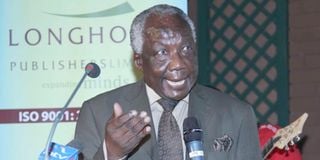Bad boy of Kenyan journalism who was possibly ahead of his time

Philip Ochieng during the launch of his biography written by Liz Gitonga-Wanjohi at The Stanley on August 21, 2015. The veteran journalist died on Tuesday evening.
What you need to know:
- I knew there was talk that he had been banned from writing in the paper because of his “Marxist” views.
- His theory of the freedom of the press included insufficient training and literacy in the use of English by journalists.
I first got to know of him when I was a student in the 1960s. While we were hurrying up and down from one lecture room to another, or to the library, Philip Ochieng could often be seen basking happily on the grassy quadrangle — glorified as the Great Court — in front of the library building, now the UNES Bookstore, of the University of Nairobi.
Invariably, he was seen chatting up some pretty girls, with a packet of Sportsman cigarettes laid in front of him.
My next encounter with Philip, who died on Tuesday, was in the early 1980s. I was the newly appoint editor-in-chief. He was the chief sub-editor, a position previously held only by British journalists.
Knowing of his prowess as a journalist, I asked him to write a regular commentary on the country’s development problems. I knew there was talk that he had been banned from writing in the paper because of his “Marxist” views but none of my superiors had told me about the ban. In any case, it was my prerogative to assign editorial work as I saw fit.
Political nemesis
However, after several instalments the Group Managing Director Dugal Nisbet-Smith directed the column be stopped. There were other incidents that irritated Philip, including one on a Saturday evening when Nisbet-Smith came to the newsroom and supervised the placement of two stories touching on a controversy about Charles Njonjo and his political nemesis Mwai Kibaki.
In his 1992 book, I accuse the Press, he says he resigned from the Nation in December 1981 because I “abdicated all responsibilities or editorial policy and production to Nisbet-Smith.”
Philip was the bad boy of Kenyan journalism who was probably ahead of his time. His theory of the freedom of the press included not only concerns such as political interference, meddling by owners and managers, self-censorship by editors, but also insufficient training and literacy in the use of English by journalists.
He writes in the book that when he was the chief sub-editor (1979-1981) the use of English was so bad “that I often... offered to conduct a basic English grammar course for everybody”. He relates an incident in 1980 when, “to arrest things at source” he proposed a training program for correspondents on the basics of the trade, including how “to put news in the most vivid language”. But nothing came of the idea.
He finally got his groove when Group Managing Editor Wangethi Mwangi suggested he should write a column on English usage. The column, ‘Mark My Word’, published in the Saturday Nation until recently, taught and censored journalists on the use of English.
Consultant revise editor
Here’re a few titles of his articles that indicate the scope and utility of ‘Mark My Word’: “There is no such thing as ‘my names’”; “You don’t put one at risk; you put him or her to risk”; “To ‘avail’ isn’t to give, offer, or make available”; “As journalists, we cheat readers whenever we misuse language” ; and “Dear sub-editor, get it right, or get out of the newsroom.”
Sub-editors who continue to get it wrong and are still in the newsroom. Who will step into Philip Ochieng’s shoes? I’ve a candidate: Dorothy Kweyu, the consultant revise editor. She is already doing “an Ochieng thing” in the newsroom.
Sample: “I’m immensely tickled as I revise the digital land transfer story. We risk ridicule as we mix conveyors (lifts or transporters) and conveyancing lawyers — those legal experts whose business is to transfer property from one entity to another. Let’s get it right from the word go, please.”
Dorothy, step into the breach.
The Public Editor is an independent news ombudsman who handles readers’ complaints on editorial matters including accuracy and journalistic standards. Email: [email protected]. Call or text 0721989264.





